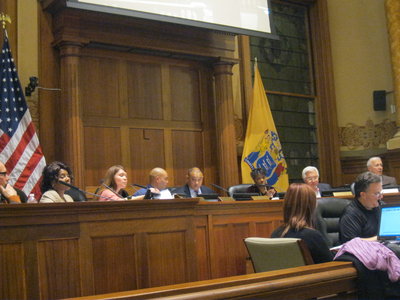The City Council and police union appear to have reached an impasse – at least temporarily – over the hours police officers will get paid for when providing traffic safety near construction and other sites.
The council debated at its Nov. 25 caucus making changes that would fundamentally change the oversight process requiring security for projects around the city, and thought the police union had agreed to changes that set minimum hours police officers would work.
But the matter was tabled at the Nov. 26 regular meeting when the council and police unions found that they had a fundamental disagreement over the wording of the changes.
The union wants a guarantee of four hours work for each officer who would be working near such sites. Several members of the City Council, including Ward E Councilwoman Candice Osborne, said they would not support a minimum hour arrangement, but would give police officers the option to refuse duty that would be four hours or less.
“With this, there would be a civilian that a person can make a case to.” – James Shea
____________
“I would not be willing to vote for that,” Osborn said.
The measure was tabled for review, but will likely come up again later because it is part of a larger revamping of the construction security system in the city.
Jersey City Public Safety Directory James Shea said a new system would create a civilian oversight department to determine whether a project would need police to oversee traffic and other safety issues. To pay for this, the fees charged would be significantly increased from $5 per hour to $15.
This raised concerns of councilmen Rich Boggiano and Michael Yun, both who said the increased fees would be a burden the small homeowners and others.
Shea said, however, that the civilian review would allow people to appeal decisions by police about whether or not a project needed safety and traffic officers on site and the increase in fees would cover the costs of civilian salaries and other costs. The fees haven’t been updated in decades and so they would be brought up to contemporary standards.
Currently, the police decide if a project needs officers on site, and how many, and there is no appealing this decision.
“Because the decision is made in the Police Department now, there is nobody that a property owner can appeal the decision to,” Shea said. “With this, there would be a civilian that a person can make a case to.”
At the caucus, the council talked with police union officials about cobbling together more than one project for officers in order to increase the hours. The oversight department might look at several projects on a particular day that would allow the officers to work more than one if a particular project needed less than four hours.
But the wording of the change when presented at the regular meeting did not guarantee four hours of work per day, and gave police officers the option to refuse the duty if it was less than four hours.
Jersey City has a number of projects planned or ongoing that often closes sidewalks and streets, and while construction companies are required to provide their own onsite security, it is currently up to the Police Department to determine if police should be on site to direct traffic or guarantee pedestrian safety.
Boggiano wanted to know if the city could use crossing guards, who could cost the city much less. Shea said that crossing guards are focused on directing pedestrians, while traffic patrol officers have a wider scope of training that includes traffic safety.
“While I have a lot of respect for the job that crossing guards do,” Shea said. “They are not trained to deal with traffic situations.”
Because this is part of a larger reorganization effort, the matter will likely be brought up in early January after the council gets clarification on this issue.
Councilwoman Janet Coleman said she could not vote on guaranteeing four hour shifts.
Al Sullivan may be reached at asullivan@hudsonreporter.com.
